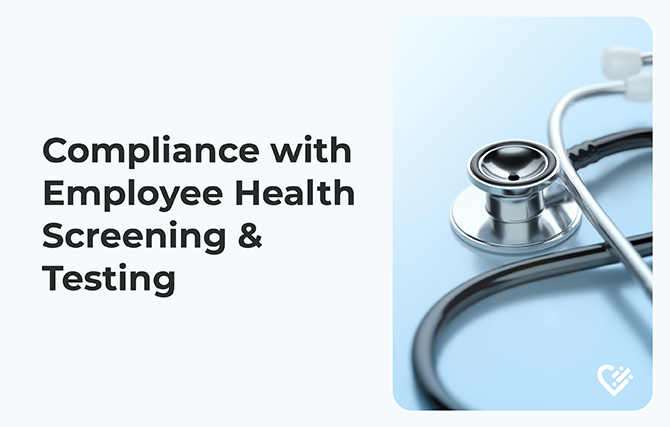In the changing modern workplace, it is now more important than ever to prioritize the well-being and safety of employees. The emphasis on “Compliance with Employee Health Screening & Testing” underscores the growing importance for businesses to integrate comprehensive employee health measures.
What are Employee Health Screenings?
Employee health screenings are systematic assessments designed to evaluate an individual’s health status. Their primary purpose is identifying potential health risks that might affect an employee’s ability to perform their job safely and efficiently. It’s essential to differentiate between screenings and surveillance. While screenings are periodic checks, surveillance is a continuous monitoring process.
The Importance of Compliance
Ensuring compliance presents challenges for employers. Screenings are important for safety, reducing absences, and building trust. It can be overwhelming, but understanding the law and keeping things private is crucial.
Types of Employee Health Screenings
There are various screening models and components tailored to different industries. For instance, a construction worker might undergo different screenings than an office worker. Some standard screenings include physical exams, blood tests, and psychological assessments, each catering to specific job requirements.
Legal Guidelines and Regulations
Understanding discrimination laws, confidentiality, consent, and recordkeeping is important for health screenings. Employers should also know about the OSHA fit-for-duty exam, which checks if employees can do certain tasks.
Implementing an Effective Health Screening Program
Implementing a health screening program involves several steps. Employers should:
- Define their goals and objectives.
- Consult with healthcare professionals.
- Develop a comprehensive screening program.
- Communicate the program’s details to employees.
- Regularly evaluate and refine the program.
Challenges and Solutions
While health screenings are beneficial, they come with challenges. Employers might need help with employee resistance, logistical issues, or concerns about confidentiality. However, today’s advanced and affordable solutions can effectively address these challenges.
The Role of Technology
Technology has changed health screenings in a big way. When integrated with EHR and EMR solutions, health screening tools provide efficient and accurate screening processes. This helps businesses stay compliant and keeps employees safe.
In summary, employee health screening and testing is a rule that demonstrates a company’s concern for its employees’ health. By staying updated on guidelines and best practices, businesses can establish a healthy, efficient, and reliable work environment. By keeping up with the latest guidelines and best practices, businesses can create a healthy, efficient, and reliable work environment.
